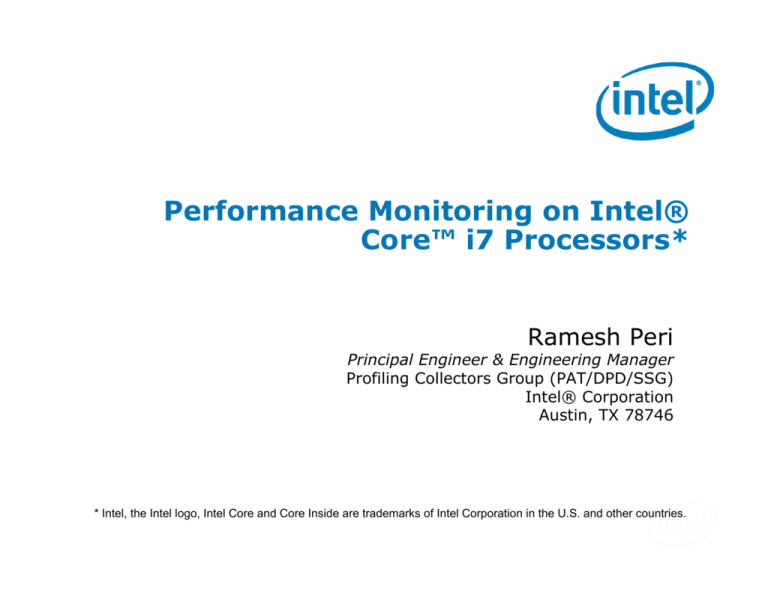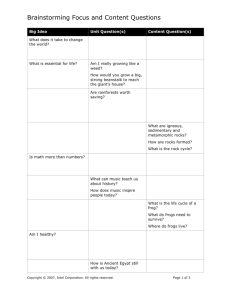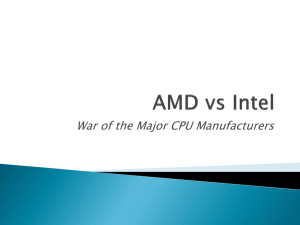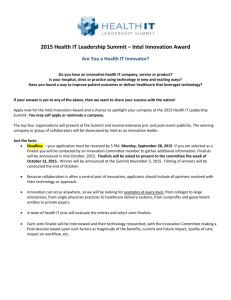
Performance Monitoring on Intel®
Core™ i7 Processors*
Ramesh Peri
Principal Engineer & Engineering Manager
Profiling Collectors Group (PAT/DPD/SSG)
Intel® Corporation
Austin, TX 78746
45nm
* Intel, the Intel logo, Intel Winning
Core and Corewith
Inside High-K
are trademarks
of IntelTechnology
Corporation in the U.S. and other countries.
High Value, High Volume, High Preference
1
Legal Disclaimer
INFORMATION IN THIS DOCUMENT IS PROVIDED IN CONNECTION WITH INTEL PRODUCTS. NO LICENSE, EXPRESS
OR IMPLIED, BY ESTOPPEL OR OTHERWISE, TO ANY INTELLECTUAL PROPERTY RIGHTS IS GRANTED BY THIS
DOCUMENT. EXCEPT AS PROVIDED IN INTEL'S TERMS AND CONDITIONS OF SALE FOR SUCH PRODUCTS, INTEL
ASSUMES NO LIABILITY WHATSOEVER AND INTEL DISCLAIMS ANY EXPRESS OR IMPLIED WARRANTY, RELATING TO
SALE AND/OR USE OF INTEL PRODUCTS INCLUDING LIABILITY OR WARRANTIES RELATING TO FITNESS FOR A
PARTICULAR PURPOSE, MERCHANTABILITY, OR INFRINGEMENT OF ANY PATENT, COPYRIGHT OR OTHER
INTELLECTUAL PROPERTY RIGHT.
UNLESS OTHERWISE AGREED IN WRITING BY INTEL, THE INTEL PRODUCTS ARE NOT DESIGNED NOR INTENDED
FOR ANY APPLICATION IN WHICH THE FAILURE OF THE INTEL PRODUCT COULD CREATE A SITUATION WHERE
PERSONAL INJURY OR DEATH MAY OCCUR.
Intel may make changes to specifications and product descriptions at any time, without notice. Designers must not rely on the
absence or characteristics of any features or instructions marked "reserved" or "undefined." Intel reserves these for future
definition and shall have no responsibility whatsoever for conflicts or incompatibilities arising from future changes to them. The
information here is subject to change without notice. Do not finalize a design with this information.
The products described in this document may contain design defects or errors known as errata which may cause the product to
deviate from published specifications. Current characterized errata are available on request.
Contact your local Intel sales office or your distributor to obtain the latest specifications and before placing your product order.
All products, computer systems, dates, and figures specified are preliminary based on current expectations, and are subject to
change without notice.
Customers, licensees, and other third parties are not authorized by Intel to use Intel code names in advertising, promotion or
marketing of any product or service.
Performance tests and ratings are measured using specific computer systems and/or components and reflect the approximate
performance of Intel products as measured by those tests. Any difference in system hardware or software design or
configuration may affect actual performance. Buyers should consult other sources of information to evaluate the performance
of systems or components they are considering purchasing. For more information on performance tests and on the
performance of Intel products, visit Intel Performance Benchmark Limitations
Copyright © 2009, Intel Corporation. All rights reserved.
Winning with High-K 45nm Technology
High Value, High Volume, High Preference
2
Risk Factors
The above statements and any others in this document that refer to plans and expectations for the first quarter, the year and the
future are forward-looking statements that involve a number of risks and uncertainties. Many factors could affect Intel’s actual
results, and variances from Intel’s current expectations regarding such factors could cause actual results to differ materially from
those expressed in these forward-looking statements. Intel presently considers the following to be the important factors that
could cause actual results to differ materially from the corporation’s expectations. Current uncertainty in global economic
conditions pose a risk to the overall economy as consumers and businesses may defer purchases in response to tighter credit and
negative financial news, which could negatively affect product demand and other related matters. Consequently, demand could
be different from Intel's expectations due to factors including changes in business and economic conditions, including conditions
in the credit market that could affect consumer confidence; customer acceptance of Intel’s and competitors’ products; changes in
customer order patterns including order cancellations; and changes in the level of inventory at customers. Intel operates in
intensely competitive industries that are characterized by a high percentage of costs that are fixed or difficult to reduce in the
short term and product demand that is highly variable and difficult to forecast. Revenue and the gross margin percentage are
affected by the timing of new Intel product introductions and the demand for and market acceptance of Intel's products; actions
taken by Intel's competitors, including product offerings and introductions, marketing programs and pricing pressures and Intel’s
response to such actions; Intel’s ability to respond quickly to technological developments and to incorporate new features into its
products; and the availability of sufficient supply of components from suppliers to meet demand. The gross margin percentage
could vary significantly from expectations based on changes in revenue levels; capacity utilization; excess or obsolete inventory;
product mix and pricing; variations in inventory valuation, including variations related to the timing of qualifying products for
sale; manufacturing yields; changes in unit costs; impairments of long-lived assets, including manufacturing, assembly/test and
intangible assets; and the timing and execution of the manufacturing ramp and associated costs, including start-up costs.
Expenses, particularly certain marketing and compensation expenses, as well as restructuring and asset impairment charges,
vary depending on the level of demand for Intel's products and the level of revenue and profits. The recent financial crisis
affecting the banking system and financial markets and the going concern threats to investment banks and other financial
institutions have resulted in a tightening in the credit markets, a reduced level of liquidity in many financial markets, and extreme
volatility in fixed income, credit and equity markets. There could be a number of follow-on effects from the credit crisis on Intel’s
business, including insolvency of key suppliers resulting in product delays; inability of customers to obtain credit to finance
purchases of our products and/or customer insolvencies; counterparty failures negatively impacting our treasury operations;
increased expense or inability to obtain short-term financing of Intel’s operations from the issuance of commercial paper; and
increased impairments from the inability of investee companies to obtain financing. Intel's results could be impacted by adverse
economic, social, political and physical/infrastructure conditions in the countries in which Intel, its customers or its suppliers
operate, including military conflict and other security risks, natural disasters, infrastructure disruptions, health concerns and
fluctuations in currency exchange rates. Intel's results could be affected by adverse effects associated with product defects and
errata (deviations from published specifications), and by litigation or regulatory matters involving intellectual property,
stockholder, consumer, antitrust and other issues, such as the litigation and regulatory matters described in Intel's SEC reports.
Winning with High-K 45nm Technology
High Value, High Volume, High Preference
3
Agenda
Goal: Provide a sample of the PMU
features of CoreTM i7
CoreTM i7 Processor Architecture
Overview
Performance features of CoreTM i7
– Loop Stream Detector
– Macro-Fusion
– Memory Access
– False Sharing
– Load Latency Threshold
Winning with High-K 45nm Technology
High Value, High Volume, High Preference
4
Platforms
Mobile/Desktop
Core 0
DDR3
HE Desktop /mobile
UP server & WS
Core 1
4M LLC
Intel® Core™ i7
Processor
QPI
DDR3
C0
C1
C2
Uncore Covered Today
8M LLC
New Uncore (Ring LLC Box Arch)
MCH
IMC
QPI
QPI Link
Discrete
Gfx
DP Servers & WS
DDR3
C0
C2
C1
C0
C3
8M LLC
IMC
Discrete
Gfx
QPI
C2
C1
C3
DDR3
8M LLC
QPI
QPI
QPI
IMC
I/O Hub
Winning with High-K 45nm Technology
High Value, High Volume, High Preference
5
I/O Hub
C3
Loop Stream Detector - Recap
Loops are very common in most software
Take advantage of knowledge of loops in HW
– Decoding the same instructions over and over
– Making the same branch predictions over and over
Loop Stream Detector identifies software loops
– Stream from Loop Stream Detector instead of normal path
– Disable unneeded blocks of logic for power savings
– Higher performance by removing instruction fetch limitations
Core 2 Loop Stream Detector
Branch
Prediction
Loop
Stream
Detector
Fetch
Decode
18
Winning with High-K
45nm Technology
Instructions
High Value, High Volume, High Preference
6
Core
TM
i7 Loop Stream Detector
Same concept as in prior implementations
Higher performance: Expand the size of
the loops detected
Improved power efficiency: Disable even
more logic
Nehalem Loop Stream Detector
Branch
Prediction
Fetch
Decode
Winning with High-K 45nm Technology
High Value, High Volume, High Preference
7
Loop
Stream
Detector
28
Micro-Ops
Loop Stream Detector – is it
working ?
LSD.UOPS is an event which provides the
number of uops delivered by loop stream
detector
A tool which can tell
– For every hot loop in the program whether the
loop stream detector is active for that loop or not
Winning with High-K 45nm Technology
High Value, High Volume, High Preference
8
CoreTM i7
Core
Core
Core
32kB L1 32kB L1
Data
Inst.
Cache
Cache
32kB L1 32kB L1
Data
Inst.
Cache
Cache
256kB
L2 Cache
256kB
L2 Cache
…
32kB L1 32kB L1
Data
Inst.
Cache
Cache
Core
256kB
L2 Cache
…
L3 Cache
DRAM
Uncore
…
IM
C
QPI
…
QPI
…
QPI: Intel®
QuickPath
Interconnect
Differentiation in the “Uncore”:
2008 – 2009 Servers & Desktops
Winning with High-K 45nm Technology
High Value, High Volume, High Preference
9
L3 Cache
Inclusive
L3 is inclusive with
respect to L1 & L2
– Provides good
scalability
– Is implemented by
maintaining a set of
“core valid” bits per
cache line in the L3
cache
L3 Cache
HIT! 0 0 0 0
Core
0
Core
1
Core
2
Core valid bits limit
unnecessary snoops
Winning with High-K 45nm Technology
High Value, High Volume, High Preference
10
Core
3
Some PMU events using this
feature
MEM_UNCORE_RETIRED.OTHER_CORE_L2_
HITM
– Load instructions retired that HIT “modified”
data in sibling core
MEM_LOAD_RETIRED.OTHER_CORE_L2_HIT
_HITM
– Load instructions retired that HIT “modified” or
“unmodified” data in sibling core
These events can enable many capabilities
like true/false sharing, race detection tools
Winning with High-K 45nm Technology
High Value, High Volume, High Preference
11
Some limitations of these events
No Store HITM
– Currently only Load HITM
No ability to identify the source core id of the
access
No ability to raise PMI based on address range for
data addresses
PEBS EIP puts current EIP
– which is the next instruction address
– Requires some clever techniques and effort to figure out
actual address
HITM in the presence of SMT is not useful
Winning with High-K 45nm Technology
High Value, High Volume, High Preference
12
Macro Fusion - Recap
Introduced in Core™ 2 Microarchitecture
TEST/CMP instruction followed by a conditional
branch treated as a single instruction
– Decode as one instruction
– Execute as one instruction
– Retire as one instruction
Higher performance
– Improves throughput
– Reduces execution latency
Improved power efficiency
– Less processing required to accomplish the same work
Winning with High-K 45nm Technology
High Value, High Volume, High Preference
13
CoreTM i7 Macro Fusion
Goal: Identify more macrofusion opportunities for
increased performance and power efficiency
Support all the cases in Core™ 2 Microarchitecture
PLUS
– CMP+Jcc macrofusion added for the following branch
conditions
– JL/JNGE
– JGE/JNL
– JLE/JNG
– JG/JNLE
Core™ only supports macrofusion in 32-bit mode
– Core™ i7 supports macrofusion in both 32-bit and 64-bit
modes
Winning with High-K 45nm Technology
High Value, High Volume, High Preference
14
How effective is Macro Fusion ?
MACHINE_CLEARS.ASSIST_FUSION
– Counts the number of fusion assists
Ensure that “all” appropriate CMP/Jxx
sequences are all fused
Winning with High-K 45nm Technology
High Value, High Volume, High Preference
15
False Sharing
What is it and why is it a Problem
– Cache coherency protocols require that all cores use
the most current version of every cacheline
– Shared lines can be modified by any thread
– Causing lines to be renewed regularly, if any
thread writes to any byte in the line
– (replace an invalid state copy with new valid copy)
– Line renewal can cause a cache miss by other
threads
– and a 40-300 cycle execution stall
– Depending on cacheline location
– False sharing is when different threads access nonoverlapping regions of a cacheline
False Sharing Causes Avoidable 40-300 Cycle Stalls
For Every Read Following a Write by Another Thread
Winning with High-K 45nm Technology
High Value, High Volume, High Preference
16
This foil is best viewed in animation mode
Data Address Profiling
and False Sharing Detection
Symbolization &
Data Address
reconstruction
Sampling during
app execution
Precise Event Sampling:
events associated with
memory operations, e.g.
Aggregation
Sample: IP, data address, threadID..
MEM_INST_RETIRED.LOADS,
MEM_INST_RETIRED.STORES…
Iterate over Samples
and PEBS records in
ebs.tb5
Pin threads affinity
Binary
To aggregate addresses into cachelines:
Using the binary,
identify the instruction
that overflowed event
counter -> IP-1
IP-1
IP
Decode it and its
Sample record:
IP, process, module,
threadID..
PEBS record:
IP, rax, rbx, rcx
operands
(registers)
Same cacheline
accessed
by different threads
at different offsets
ebs.tb5 True and False
Sharing
Reconstruct
data
address used by IP-1
Next foils Illustrate
GUI
instruction and
register
values
in
Navigation
PEBS record
Winning with High-K 45nm Technology
High Value, High Volume, High Preference
17
Synthetic Example: Heavy Contention on this Line -Multiple Threads Accessing Different Offsets Indicate
False Sharing (Identified by Rose Highlighting)
Winning with High-K 45nm Technology
High Value, High Volume, High Preference
18
Expanding the “arrow” we see the 2
threads access the line at Different
Offsets…This is False Sharing
Winning with High-K 45nm Technology
High Value, High Volume, High Preference
19
Select the falsely shared cacheline (now blue)
and Filter the Hotspot view to only Display
Accesses to that Line (multiple lines also work)
Winning with High-K 45nm Technology
High Value, High Volume, High Preference
20
Only Events Referencing the Selected
Line(s) are now in the Hotspot View
Double Click to reach source/ASM view
Winning with High-K 45nm Technology
High Value, High Volume, High Preference
21
The Pointer “sum” is Causing the
False Sharing
Winning with High-K 45nm Technology
High Value, High Volume, High Preference
22
Load Latency Threshold Event
Ability to trigger count on minimum latency
– Core cycles from load execute->data availability
Linear address in PEBS buffer
– Allows driver to collect physical address
– Only total measurement of local/remote home access
Data source captured in bit pattern
– Actual NUMA source revealed
Only ONE latency event/min thresh can be
taken per run
– Minimum latency programmed with MSR
– Global per core
– 0x3F6 MS_PEBS_LD_LAT_THRESHOLD bits 15:0
Can use to detect a variety of properties about
memory accesses
– Local vs remote etc.
– Can be filtered
at with
hot spots
detect causes for
Winning
with High-K
45nmto
Technology
them
High Value, High Volume, High Preference
23
Call to Action
Download PTU from
http://software.intel.com/en-us/
articles/intel-performance-tuningutility/ and have fun
– Makes all the events of CoreTM i7 available
If you have any questions or comments
you can reach me at
ramesh.v.peri@intel.com or ask them in
the discussion forums at
http://software.intel.com/en-us/
forums/
Winning with High-K 45nm Technology
High Value, High Volume, High Preference
24
Legal Acknowledgements
Intel, the Intel logo, Intel Core and Core Inside are trademarks of Intel Corporation in the U.S. and other countries.
Vtune is a trademark of Intel Corporation in the U.S. and other countries.
Itanium is a trademark or registered trademark of Intel Corporation or its subsidiaries in the United States and other
countries.
Other names and brands may be claimed as the property of others.
Winning with High-K 45nm Technology
High Value, High Volume, High Preference
25








